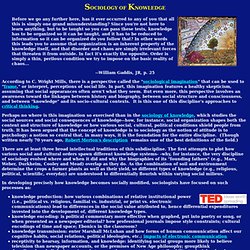

THE SOCIOLOGY OF KNOWLEDGE. Before we go any further here, has it ever occurred to any of you that all this is simply one grand misunderstanding?

Since you're not here to learn anything, but to be taught so you can pass these tests, knowledge has to be organized so it can be taught, and it has to be reduced to information so it can be organized do you follow that? In other words this leads you to assume that organization is an inherent property of the knowledge itself, and that disorder and chaos are simply irrelevant forces that threaten it from outside. In fact it's exactly the opposite. Order is simply a thin, perilous condition we try to impose on the basic reality of chaos... --William Gaddis, JR, p. 25 According to C. There are at least three broad intellectual traditions of this subdiscipline. In developing precisely how knowledge becomes socially modified, sociologists have focused on such processes as: How does one know what knowledge is factual in this medium, what ideas are worthy of our attention? Crowd psychology. Crowd psychology, also known as mob psychology, is a branch of social psychology.

Social psychologists have developed several theories for explaining the ways in which the psychology of the crowd differs from and interacts with that of the individuals within it. Major theorists in crowd psychology include Gustave Le Bon, Gabriel Tarde, Sigmund Freud and Steve Reicher. This field relates to the behaviors and thought processes of both the individual crowd members and the crowd as an entity.[1] Crowd behavior is heavily influenced by the loss of responsibility of the individual and the impression of universality of behavior, both of which increase with the size of the crowd.[2][3] Origins[edit] The psychological study of crowd phenomena began in the decades just prior to 1900 as European culture was imbued with thoughts of the fin de siècle. The first debate in crowd psychology began in Rome at the first International Congress of Criminal Anthropology on 16 November 1885. See also[edit] The children who won't grow up. Introduction to Social Influence, Persuasion, Compliance & Propaganda.
This portion of the Working Psychology website offers a brief introduction to a big topic: social influence, the modern, scientific study of persuasion, compliance, propaganda, "brainwashing," and the ethics that surround these issues. Although these topics aren't always simple (it is, after all, science), I've done my best to make this introduction interesting. Since Aristotle recorded his principles of persuasion in Rhetoric, humans have attempted to define and refine the principles of successful influence. Persuasion has been studied as an art for most of human history. The comparatively young science of social influence, however, can trace its roots to the second world war, when a social psychologist named Carl Hovland was contracted by the U.S. Armed Forces to bolster the morale of soldiers. Social scientists attempt to support any assertion with facts. Want a few examples of how social influence works in the real world before you continue?
Copyright © 2002 by Kelton Rhoads, Ph.D. Process of Socialization: Socialization. What You Can't Say. January 2004 Have you ever seen an old photo of yourself and been embarrassed at the way you looked?

Did we actually dress like that? We did. And we had no idea how silly we looked. It's the nature of fashion to be invisible, in the same way the movement of the earth is invisible to all of us riding on it. What scares me is that there are moral fashions too. If you could travel back in a time machine, one thing would be true no matter where you went: you'd have to watch what you said. It seems to be a constant throughout history: In every period, people believed things that were just ridiculous, and believed them so strongly that you would have gotten in terrible trouble for saying otherwise.
Is our time any different? It's tantalizing to think we believe things that people in the future will find ridiculous. SOCIOLOGICAL SUBJECTS. Social Science Resources: Sociology and Anthhropology. Virtue Ethics. 1.

Preliminaries Virtue ethics' founding fathers are Plato and, more particularly Aristotle (its roots in Chinese philosophy are even more ancient) and it persisted as the dominant approach in Western moral philosophy until at least the Enlightenment. It suffered a momentary eclipse during the nineteenth century but re-emerged in the late 1950's in Anglo-American philosophy. It was heralded by Anscombe's famous article “Modern Moral Philosophy” (Anscombe 1958) which crystallized an increasing dissatisfaction with the forms of deontology and utilitarianism then prevailing. Its re-emergence had an invigorating effect on the other two approaches, many of whose proponents then began to address these topics in the terms of their favoured theory. But although modern virtue ethics does not have to take the form known as “neo-Aristotelian”, almost any modern version still shows that its roots are in ancient Greek philosophy by the employment of three concepts derived from it. 2. 3.
(a) (b) 4.